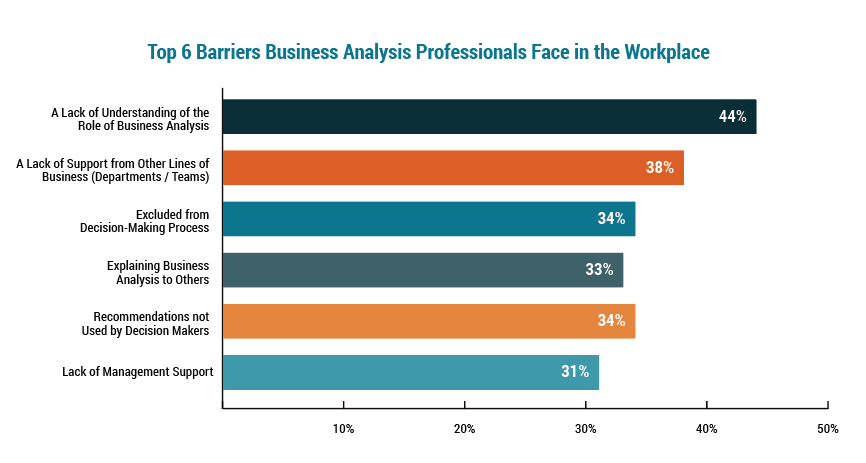How to Break Down Barriers at Work
What is the biggest challenge you face in your role? According to data collected from IIBA’s 2019 Global Business Analysis Salary Survey, 44% of business analysis professionals report the number one barrier at work is a lack of understanding of the role of business analysis. Another 33% report they have to explain what business analysis is to others. Results show the most common obstacles BAs face at work include a lack of understanding of the role, lack of support and being excluded from decision-making.

Don’t be discouraged by these results. There are steps you can take to raise your profile at work. These obstacles are not exclusive to BAs – lots of professionals in different roles express similar concerns. I’ve often heard professionals complain that their boss doesn’t really understand what they do… so you are not alone!

So, what can you do to change the situation?
Ask questions when assigned a task to understand why your boss thinks a project is a priority. Yes, as a BA you have a good understanding of the business and eliciting requirements is second nature, but it is still critical to ensure you are on the same page as your boss. Educating your boss while providing an update is key for the survey respondents who identified a lack of support in their role as a barrier at work. Thirty-one percent cited a lack of management support, while 38% reported a lack of support from other lines of business (departments/teams). So, what can you do to stop banging your head against your desk?
Tell a Compelling Story
Use your BA skills and techniques to explain your role; think user stories and storytelling to highlight how business analysis professionals translate the “what” the C-suite needs done into the “how”. Showcase how BAs can help organizations capture the value of digital transformation focus on the customer - in every state of their strategy and solution development. Take the example of a large financial institution that used strategy analysis to solve their issue of declining market share. The outcome? The organization got back on course to retain its market leadership position and saw $94.95 million in incremental value in only six-months. Real-life scenarios like this example vividly illustrate the important role of business analysis in the decision-making process.
Expose Your Executive Team to Business Analysis Opportunities
Being heard and valued at work also proves to be an obstacle for some BAs. Almost 34% said being excluded from the decision-making process is their biggest barrier while another 34% said having their recommendations not used by decision makers presents a barrier at work.
The confusion or lack of understanding of the role of the BA and the practice may be due to changing roles where the business analyst title is changing to become a hybrid role or evolving into a new role in areas like data analytics, cybersecurity, product ownership, etc. It is important to remember analysis is what you do, regardless of your title. The challenge for practitioners is when the business analysis skill sets are rolled up into other roles making the understanding of what you do unclear to others.
Show them the money
Share case studies and whitepapers on outcomes influenced by business analysis. Help your business grow their revenues. Build alliances with decision-makers in your organization to get them onside as your advocate. Build your personal brand by seeking opportunities both inside and externally to position yourself as an expert in your field.
Join your local IIBA Chapter
Getting support from other professionals who may be experiencing similar challenges can lend advice, support, and empower each other. Talk about your challenges in IIBA’s LinkedIn group where you can share your challenges and seek advice from like-minded professionals from around the world who can learn from what worked for them in similar situations.
Show them what you can do
Educate your employer and other departments about the role of business analysis. Focus on the shift to value-driven analysis to help your employer to expand their expectations of business analysis capabilities. Use your strategic thinking and analysis, leadership and communication skills to raise your profile.
Tell us what barriers you face in your BA role. Does your company’s C-suite understand the role of business analysis? How do you educate management about what business analysis does? Share your thoughts on social media using #BAmatters or join us on LinkedIn.
Visit In the Life of a BA for practical stories, techniques, tools and templates about business analysis professionals for business analysis professionals.